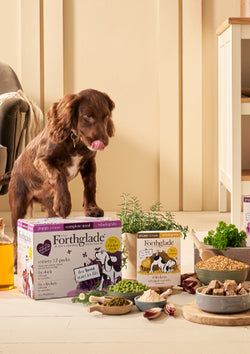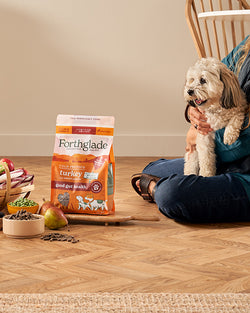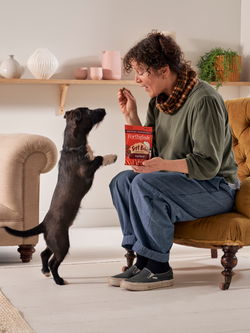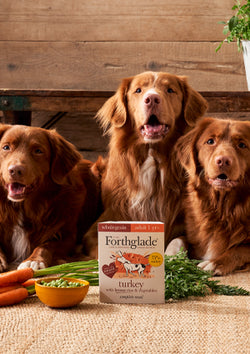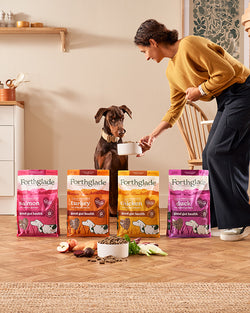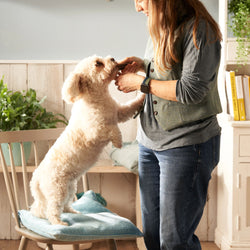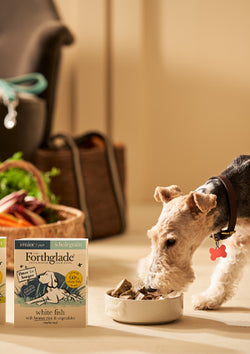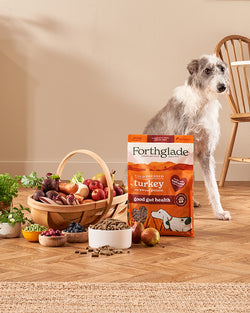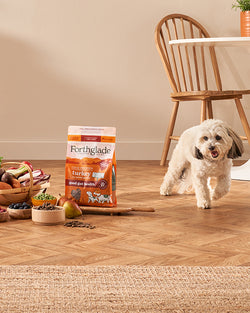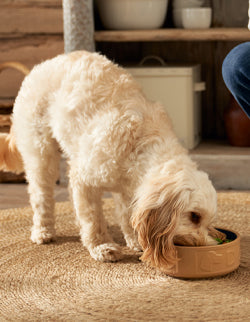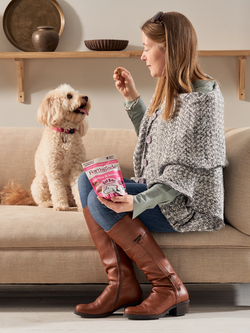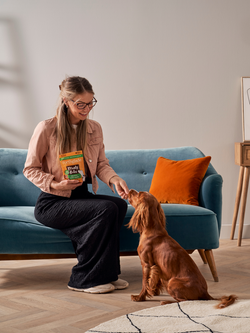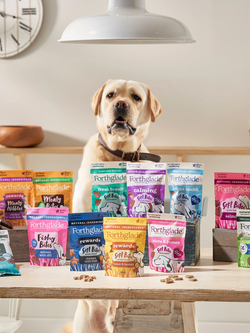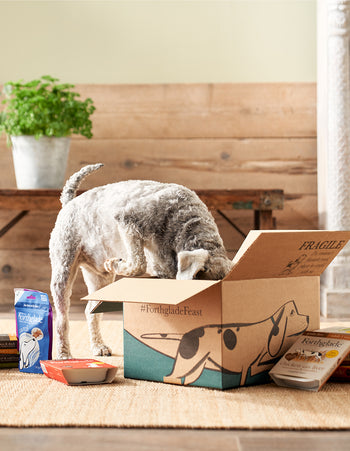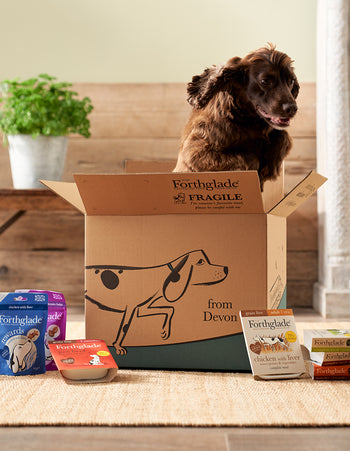Welcoming a litter of puppies into the world is exciting, but it also comes with big responsibilities, especially when it comes to your dog’s nutrition. Feeding a pregnant dog isn’t the same as feeding before pregnancy. Her body needs extra nutrients, energy, and care to support healthy puppies and keep her strong through pregnancy, birth, and nursing.
In this guide, we’ll explain everything you need to know about feeding a pregnant dog: what to feed, how much, and why puppy food is often the best choice. We’ll also cover feeding during nursing and weaning so you feel confident at every stage.
For more advice on preparing your home and routine for a new arrival, check out our guide to preparing for a new puppy.

Nutrition for Pregnant Dogs
Pregnant dogs need a diet that supports both their health and the growth of developing puppies. This means higher amounts of:
- Protein: for tissue growth and strong development of puppies.
- Fat and calories: to provide the extra energy needed throughout pregnancy.
- Calcium and phosphorus: to support skeletal development.
- Omega-3 fatty acids: for brain, eye, and nervous system development.
- Vitamins and minerals: to balance immunity and overall wellbeing.
If your dog is expecting a large litter, her energy demands will be even higher. That’s why veterinarians often recommend switching to a high-quality, nutritionally complete puppy food during pregnancy.
Why You Should Feed Your Pregnant Dog Puppy Food
Puppy food is ideal for pregnant and nursing dogs. Why? Because it’s formulated to be nutrient dense and calorie rich, with higher protein and fat levels than standard adult food.
As puppies grow, they take up more space inside the mother’s abdomen, leaving less room for her stomach to hold large meals. Puppy food packs more nutrition into smaller portions, helping her stay energised even if she eats less.
Look for complete and balanced recipes labelled suitable for "all life stages.” These provide all the micronutrients and energy your pregnant dog needs.

How Much Should I Feed a Pregnant Dog?
During the early stages of pregnancy (the first 5 weeks), most dogs can stay on their normal feeding routine. But from week 6 onward, her calorie needs rise.
The best approach is to:
- Offer smaller, more frequent meals to avoid overloading her stomach.
- Gradually increase portion size from week 6 until whelping.
- Choose “all life stages” or puppy food, which is richer in calories and nutrients.
Some pregnant dogs can become picky eaters. If that happens, you can mix in a little warm water to soften a drier food, or try rotating flavours to encourage her appetite.
For more advice on transitioning foods, see our guide on changing a dog’s diet
How Much Should I Feed a Dog During Nursing?
Nursing takes even more energy than pregnancy, your dog is now providing milk for a whole litter. To support her, keep feeding the puppy formula she ate during pregnancy.
Key feeding guidelines:
- Weeks 1 - 3 of nursing: Feed 3 meals per day.
- Week 4 onward: Increase to 4 meals per day.
- Calories and protein: Choose food with at least 1,600 kcal ME per pound and at least 22% protein.
The exact amount will depend on her breed size and litter size, larger litters mean higher food intake. In fact, a nursing mother may eat 2 - 4 times her pre-pregnancy diet.
Practical tips:
- Always provide fresh water in a clean bowl.
- Let her eat freely, unless she’s gaining too much weight
- If she’s losing weight, try moistening food or offering a more nutrient-dense recipe.
Explore our wet puppy food range for high-quality, nutrient-rich options ideal for nursing dogs.
Food Intake for Dogs During Pregnancy
Pregnancy in dogs lasts about nine weeks, and nutritional needs shift as it progresses.
- Weeks 1 - 5: Normal feeding routine is fine.
- Weeks 6 - 7: Increase food intake by about 25%.
- Weeks 8 - 9: Appetite may drop as the puppies press on her stomach, smaller, frequent meals work best.
If her appetite suddenly disappears or she shows signs of distress, consult your vet immediately. Every dog is different, so professional guidance is key
Food Intake for Lactating Dogs
Once the puppies arrive, your dog’s calorie needs will steadily rise as the litter grows.
- Weeks 1 - 3: Expect a gradual increase in food intake.
- Weeks 3 - 4: She may eat two to four times her normal amount.
- Encourage appetite by moistening food or offering softer textures.
Around week 3 or 4, puppies often start nibbling at their mother’s food, a perfect introduction to solids.

Weaning Puppies
Weaning usually happens between 6 - 8 weeks. This is when puppies transition from milk to solid food.
To help:
- On the first day of weaning, provide the mother with only water and small treats, no full meals. This helps to stop milk production once the puppies are weaned.
- From day 2 - 5, gradually return her to pre-pregnancy food intake:
- Day 2: ¼ of pre-pregnancy intake
- Day 3: ½
- Day 4: ¾
- Day 5: full amount
At the same time, encourage puppies to eat dry puppy food, soaked if needed, and use puppy treats as a reward during training. This gradual shift supports both the mother’s recovery and the puppies’ growth.
The Takeaway
Feeding a pregnant dog properly is one of the most important ways you can support her and her puppies.
Key things to remember:
- Switch to puppy food or “all life stages” recipes for pregnancy and nursing.
- Increase portions gradually in the last trimester.
- During nursing, let her eat freely, she’ll need up to 4x her normal intake.
- Always provide fresh water.
- Wean puppies slowly while transitioning mum back to her regular diet.
At Forthglade, our puppy food and treats range is crafted with high-quality ingredients to support growing pups and their hardworking mums too.






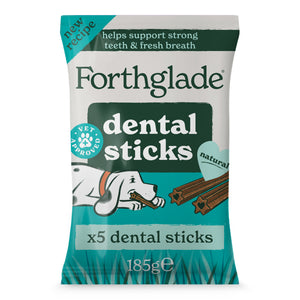

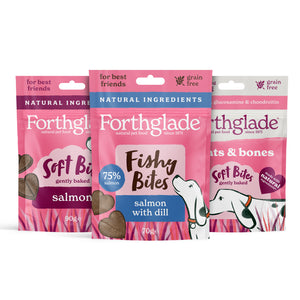
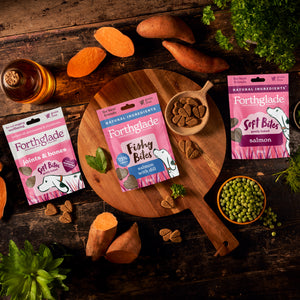


 FAST & FREE DELIVERY ON ORDERS £40+*
FAST & FREE DELIVERY ON ORDERS £40+*
 SUBSCRIBE TO SAVE 10% OFF EVERY ORDER
SUBSCRIBE TO SAVE 10% OFF EVERY ORDER
 OVER 13,600 5 STAR REVIEWS
OVER 13,600 5 STAR REVIEWS


